
December 19, 2018, by Liz Goodwin
University News Review — November and December 2018
The latter end of 2018 saw many University of Nottingham news stories in the headlines…
Annus horribilis… was AD536 the worst year to be alive?
A new study from the University has found ground-breaking evidence from an ice core in the Swiss-Italian Alps that proves the 7th century switch from gold to silver currencies in western Europe actually occurred a quarter of a century earlier than previously thought.
The findings will have major implications on the history of the European monetary system, and what we thought we knew about trade and economy during this period.
The story, which was featured in The Times, The Mail Online, Time Magazine, CNN and Russia Today, generated 277 articles and amassed a total reach of 265m and advertising value of £2.4m.
Charlotte Anscombe, Media Relations Manager for Arts, worked with Professor of Medieval European Archaeology Christopher Loveluck to promote the story. Professor Loveluck who co-authored the study which analysed glacial ice for evidence of atmospheric change and its effect on the financial landscape of early Europe, was quoted in The Times, saying:
“It would have made places very cold, very quickly, and would have been most felt in Britain and north western Europe.”
Underground food farms in abandoned coal mines
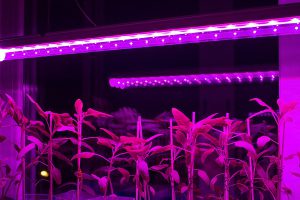 Emma Lowry in the Press Office worked with Professor Saffa Riffat, Chair of Sustainable Energy, to highlight a research story from the Faculty of Engineering, which generated some high profile coverage in November and early December.
Emma Lowry in the Press Office worked with Professor Saffa Riffat, Chair of Sustainable Energy, to highlight a research story from the Faculty of Engineering, which generated some high profile coverage in November and early December.
Engineering academics are exploring a new concept for subterranean farms as an alternative approach to large scale crop production, improving food safety, yield and cost efficiency. There are millions of redundant coal mines and tunnels in the world which could be linked to new tunnels for crop production. In the UK there are over 1,500 redundant coal mines, and in China, there are over 12,000 abandoned coal mines.
The story featured in The Times, The Mail Online, BBC News Online and The Engineer, along with a feature on local BBC1 broadcast news. Speaking on East Midlands Today, Professor Riffat explained to presenter Quentin Rayner that mine shafts and tunnels are seen as the perfect environment for growing food such as vegetables and herbs.
The Great Escape from Sutton Bonington
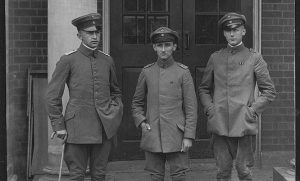 Remembrance Sunday on November 11 marked the 100th anniversary of the Armistice in 1918 that signalled the end of World War One.
Remembrance Sunday on November 11 marked the 100th anniversary of the Armistice in 1918 that signalled the end of World War One.
As part of the University’s series commemorating the centenary, Media Relations Manger Charlotte Anscombe looked back at the University of Nottingham’s very own Great Escape story.
At 1.30am on the morning of September 25 1917, 22 military officers detained at a prisoner of war camp at Sutton Bonington escaped through a secret tunnel and dispersed into the countryside. The camp was very different back then to the site as we know it today.
Professor John Beckett from the Department of History, explained: “Escapers had all sorts of motives. Officers were more likely than other ranks to attempt to escape. They saw it as their duty to return to active military service, or at least to divert to local manpower into searching for them.”
By the summer of 1917 two attempts at tunnelling out of the camp had been foiled by the guards. The driving force behind these tunnels was Lieutenant Otto Thelan of the German Army Flying Corps, the first airman to be made a POW when his aeroplane was wrecked and he was discovered floating on it in the North Sea. By the time he reached Sutton Bonington he already had a reputation for his escape attempts from several different camps, establishing the nicknames ‘Slippery Dick’ or ‘Germany’s Monte Cristo.’
You can read more about the University in Wartime Project on The Centre for Hidden Histories: Community, Commemoration and the First World War website.
Challenges to the PM’s leadership intensify over Brexit negotiations
 Theresa May faced a vote of no confidence in early December over her Brexit leadership. The secret ballot – where MPs can pledge total loyalty to the Prime Minister or wield the knife to oust her – saw her survive the vote with a majority of 83.
Theresa May faced a vote of no confidence in early December over her Brexit leadership. The secret ballot – where MPs can pledge total loyalty to the Prime Minister or wield the knife to oust her – saw her survive the vote with a majority of 83.
In the run up to the vote, Assistant Professor Mark Stuart of the School of Politics and International Relations, wrote an Op Ed in The Times pointing out that “no government at least since World War Two has had to pause a vote on a major international treaty.”
Professor Stuart was interviewed on BBC1 East Midlands Today in advance of the vote, offering his reflections on the unchartered political waters. He told reporter Simon Ward:
“I think the Conservative ‘right’ – in the shape of the European Research Group – have decided that time is up for the Prime Minister… I don’t think she will go. I think she’ll survive a flesh wound, but I don’t think it’ll be a mortal wound.”
A specially designed high-chair for Buck the Labrador
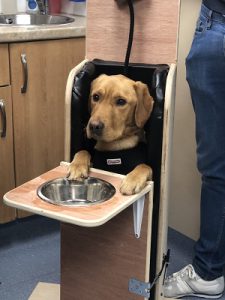 The heart-wrenching story of Buck the Labrador hit the headlines in November, appearing on BBC News, ITV News, and in the Mail, Mirror, Sun and Metro Online. The young dog was unable to swallow properly and was in danger of starving to death until a creative invention by the University of Nottingham and De Montfort University offered Buck a happy ending.
The heart-wrenching story of Buck the Labrador hit the headlines in November, appearing on BBC News, ITV News, and in the Mail, Mirror, Sun and Metro Online. The young dog was unable to swallow properly and was in danger of starving to death until a creative invention by the University of Nottingham and De Montfort University offered Buck a happy ending.
Emma Rayner, Media Relations Manager for Medicine and Health Sciences, told the story of the 17-month-old dog who suffers from a rare condition called ‘mega-oesophagus’ which means he struggles to swallow enough food. He weighed half what he should at his age.
Specially-made chairs can help dogs like Buck by sitting them upright, but none could be sourced quickly enough. So seeing a social media post and recognising the danger Buck was in, University of Nottingham vet Emma Drinkall and her fiancé Nick Rowan, a senior lecturer in product design and engineering at DMU, rose to the challenge.
Filming on campus
New £9m Cripps Health Centre opens
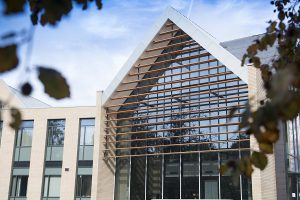 The official opening of the University’s new Cripps Health Centre took place on November 12. An ITV News camera crew came onto campus to film the opening and interview Robert Cripps, Director of Philanthropy and third generation family representative of the Cripps Foundation.
The official opening of the University’s new Cripps Health Centre took place on November 12. An ITV News camera crew came onto campus to film the opening and interview Robert Cripps, Director of Philanthropy and third generation family representative of the Cripps Foundation.
It was thanks to a transformational gift of £9m from the Cripps Foundation which allowed the University to refresh its original vision to create a 21st century healthcare and well-being facility for students, staff and the community, unrivalled within higher education.
Robert Cripps, said: “You’ve got a lot of young people going away to university and it’s probably the first time they’ve been away from their families for any length of time. They need to be looked after, housed properly, given support and their health needs to be taken care of.”
Fashion icon Sir Paul Smith delivers lecture
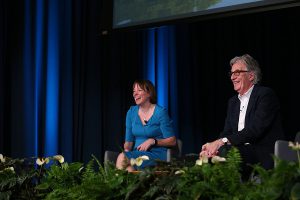 The University also welcomed fashion designer Paul Smith onto campus on November 12.
The University also welcomed fashion designer Paul Smith onto campus on November 12.
Nottingham-born Sir Paul spoke with Notts TV after giving a talk to young entrepreneurs at the University of Nottingham. He provided insight on his career to date and into his belief that ‘you can find inspiration in everything and if you can’t, look again.’
Watch Notts TV video clip here.
And finally…
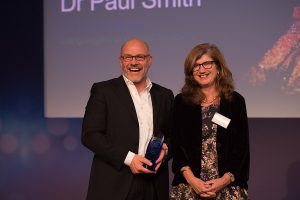 The University’s Knowledge Exchange and Impact Awards took place on Thursday 22 November at the East Midlands Conference Centre.
The University’s Knowledge Exchange and Impact Awards took place on Thursday 22 November at the East Midlands Conference Centre.
More than 250 colleagues, industry and civic partners and friends attended the awards evening to celebrate the impact of our research in Nottingham, the UK and across the world.
Professor Dame Jessica Corner, Pro-Vice-Chancellor for Research and Knowledge Exchange, who welcomed guests, said: “This was an inspirational evening. It was a celebration of not only exceptional individuals and transdisciplinary teams but the power of our partnerships. By exploring new ways of working with collaborators beyond the University, our research is delivering innovation that is having a real impact, enriching and saving lives and increasing our understanding of the world and the challenges we face.”
No comments yet, fill out a comment to be the first


Leave a Reply